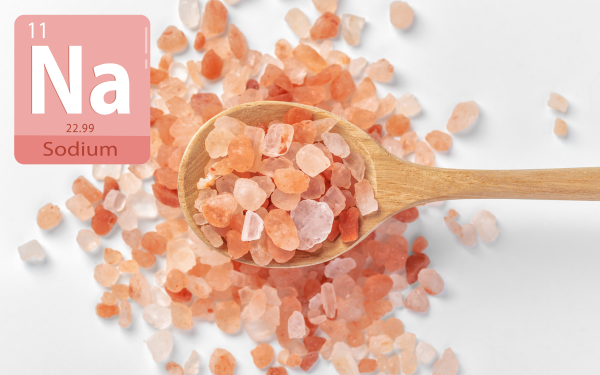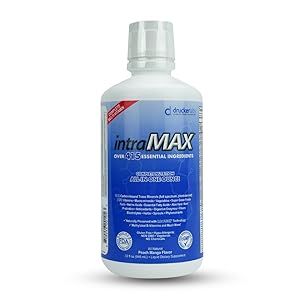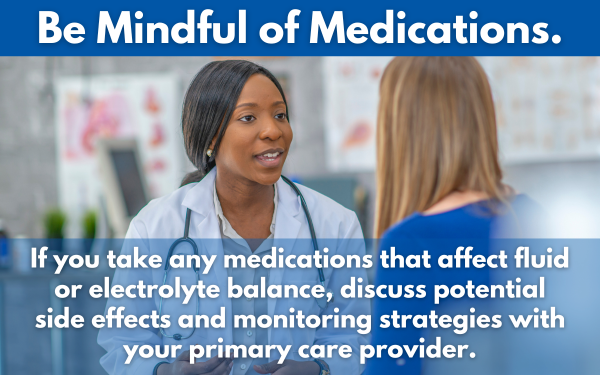The Critical Role of Electrolyte Balance in Your Health
 Electrolytes are essential for maintaining numerous bodily functions, yet their importance often flies under the radar in discussions about health and wellness.
Electrolytes are essential for maintaining numerous bodily functions, yet their importance often flies under the radar in discussions about health and wellness.
At LivingWell Chiropractic in Bonita Springs, FL, Dr. Vivian Ebert emphasizes a holistic approach to health, focusing on balanced nutrition (Eat Well), mental health (Think Well), physical wellness (Move Well), and the consideration of strategic supplementation of essential nutrients.
Understanding the intricacies of electrolyte balance (and the surprising role of sodium) can empower you to make informed decisions about your health.
What Are Electrolytes and Why Are They Important?
Electrolytes are minerals that carry an electric charge and are vital in regulating many bodily processes. Key electrolytes include sodium, potassium, calcium, magnesium, chloride, bicarbonate, and phosphate. These minerals work together to maintain fluid balance, nerve signaling, muscle contractions, and acid-base equilibrium (the fancy term for maintaining stable blood pH levels).
For example, your heart relies on a precise interplay of sodium and potassium to maintain its rhythm. Muscles—including the diaphragm, essential for breathing—need calcium and magnesium to contract and relax properly. Even your ability to think clearly depends on electrolytes, as they facilitate the transmission of nerve signals in the brain. When electrolyte levels become imbalanced, symptoms can range from mild fatigue to life-threatening conditions like arrhythmias or seizures.
Sodium: The Misunderstood Electrolyte
 Among all electrolytes, sodium often gets a bad reputation due to its association with high blood pressure and cardiovascular disease. While excessive sodium intake from processed foods is indeed a concern, sodium is also essential for health. Sodium helps regulate fluid balance, nerve function, and muscle contractions, and it’s a critical component of the body’s response to heat and dehydration.
Among all electrolytes, sodium often gets a bad reputation due to its association with high blood pressure and cardiovascular disease. While excessive sodium intake from processed foods is indeed a concern, sodium is also essential for health. Sodium helps regulate fluid balance, nerve function, and muscle contractions, and it’s a critical component of the body’s response to heat and dehydration.
Surprisingly, recent studies suggest that low sodium levels (hyponatremia) may be just as harmful as excessive sodium. Chronic low sodium levels have been linked to increased fall risks in older adults, impaired cognitive function, and even higher mortality rates in specific populations. Furthermore, emerging research challenges the blanket recommendation to limit sodium intake for all individuals, suggesting that an optimal range—rather than an absolute minimum—may be more beneficial for overall health.
Common Causes of Electrolyte Imbalances
Electrolyte imbalances can occur for various reasons, including dehydration, illness, or dietary deficiencies. In Florida’s unpredictable climate, with its common heat and humidity potential in all seasons, sweating during outdoor activities can lead to significant sodium and potassium loss. Other common causes include:
- Diuretics and certain blood pressure medications can deplete sodium and potassium levels.
- Vomiting, diarrhea, and fever can disrupt fluid and electrolyte balance.
- Dietary Choices. Restrictive diets or overemphasizing processed foods can lead to deficiencies or imbalances in essential minerals.
- Chronic Conditions. Conditions like kidney disease, diabetes, or hormonal imbalances can interfere with the body’s ability to regulate electrolytes.
Signs of Electrolyte Imbalance
Recognizing the signs of an electrolyte imbalance is crucial for early intervention. Symptoms may include:
- Muscle cramps or spasms
- Fatigue or weakness
- Dizziness or lightheadedness
- Irregular heartbeat
- Confusion or difficulty concentrating
- Nausea or vomiting
If you experience these symptoms, especially after prolonged physical activity or illness, it’s essential to consult your primary care physician to determine the underlying cause and appropriate treatment.
 Maintaining Electrolyte Balance
Maintaining Electrolyte Balance
Achieving optimal electrolyte balance involves a combination of proper hydration, a nutrient-rich diet, and strategic supplementation when needed. Here are some practical tips to maintain healthy electrolyte levels:
Stay Hydrated
Drinking adequate water is essential, but don’t overlook the importance of electrolyte-containing beverages, especially after heavy sweating or exercise. Coconut water, sports drinks (with minimal added sugars), and electrolyte powders can help replenish lost minerals.
Eat a Balanced Diet
Incorporate whole, nutrient-dense foods rich in electrolytes, such as bananas (potassium), leafy greens (magnesium and calcium), nuts and seeds (magnesium), and dairy products (calcium). For sodium, focus on naturally salty foods like seaweed or minimally processed salts.
Consider Quality Supplements
 High-quality supplements can be a game-changer for those struggling to meet their electrolyte needs through diet alone. Many supplements are available on the market, but at LivingWell Chiropractic, we recommend Intramax® as a comprehensive electrolyte and nutrient support solution. (FUN FACT: Dr. Vivian Ebert takes Intramax regularly!)
High-quality supplements can be a game-changer for those struggling to meet their electrolyte needs through diet alone. Many supplements are available on the market, but at LivingWell Chiropractic, we recommend Intramax® as a comprehensive electrolyte and nutrient support solution. (FUN FACT: Dr. Vivian Ebert takes Intramax regularly!)
Intramax is a liquid, organic, and carbon-bonded supplement that provides over 415 essential nutrients, including a robust profile of electrolytes such as sodium, potassium, calcium, and magnesium, as well as trace minerals and vitamins that synergistically promote overall health. Studies on multi-nutrient supplements indicate comprehensive nutrient support can improve energy levels, cognitive function, and immune health.
In short, think of electrolytes as the unsung heroes of your body’s physiological processes, pivotal in hydration, energy production, and cellular function. Maintaining the right balance of electrolytes—including sodium—is essential for optimal health, especially in fluctuating climates like Florida’s. By staying hydrated, eating a balanced diet, and considering high-quality supplements, you can support your body’s natural rhythms and prevent the many pitfalls of electrolyte imbalance.
When searching for a “chiropractor near me,” you can feel confident directing all your chiropractic care-related questions to Dr. Vivian Ebert of LivingWell Chiropractic in Bonita Springs, FL (on the border of Estero). Visit Dr. Ebert in The Brooks Town Center at the northwest corner of Three Oaks Parkway and Coconut Road.
LivingWell Chiropractic provides state-of-the-art chiropractic care, spinal decompression, medical massage, and nutritional guidance with a holistic wellness approach focused on pain relief for patients with musculoskeletal conditions. Centrally located in Bonita Springs, the office is convenient for patients from Estero, Bonita Springs, Naples, and South Fort Myers.
Posted In:
Live Well Articles

